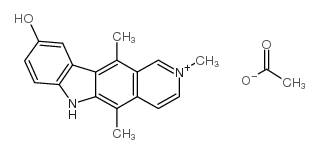58337-35-2
| Name | 2,5,11-trimethyl-6H-pyrido[4,3-b]carbazol-2-ium-9-ol,acetate |
|---|---|
| Synonyms |
ELLIPTINIUM ACETATE
Ellipticine acetomethylate 9-hydroxy-2-methylellipticinium acetate elliptinium Elliptinii acetas [INN-Latin] EINECS 261-216-0 Acetato de eliptinio [INN-Spanish] Acetate d'elliptinium [INN-French] Celiptium 9-hydroxy-N-2-methylellipticinium acetate Elliptinium acetate [INN:BAN] N2-Methylhydroxyellipticinium acetate N2-methyl-9-hydroxyellipticinium acetate |
| Description | Elliptinium acetate (NSC 264137) is a DNA intercalating agent that is highly cytotoxic to L1 210 cells and covalently binds to nucleic acids from L1210 cells. Elliptinium acetate can be used in cancer research, particularly in metastatic breast cancer[1][2]. |
|---|---|
| Related Catalog | |
| Target |
Nucleic acids[1][2]. |
| In Vitro | Elliptinium (0.35 µM; 1 h) (9-OH-NME3) shows highly stable covalent bonding to nucleic acids of L1210 cells[1]. Cell Viability Assay[1] Cell Line: L1 210 cells Concentration: 0.35 µM Incubation Time: 1 h Result: Exhibited highly stable covalent bonding to DNA and RNA. Showed no reversal of binding as cells went on replicating during a 40-h period. |
| Molecular Formula | C20H20N2O3 |
|---|---|
| Molecular Weight | 336.38400 |
| Exact Mass | 336.14700 |
| PSA | 80.03000 |
| LogP | 2.37740 |
CHEMICAL IDENTIFICATION
HEALTH HAZARD DATAACUTE TOXICITY DATA
MUTATION DATA
|
| Precursor 0 | |
|---|---|
| DownStream 1 | |

![2,5,11-trimethylpyrido[4,3-b]carbazole-9,10-dione structure](https://image.chemsrc.com/caspic/299/84303-55-9.png)